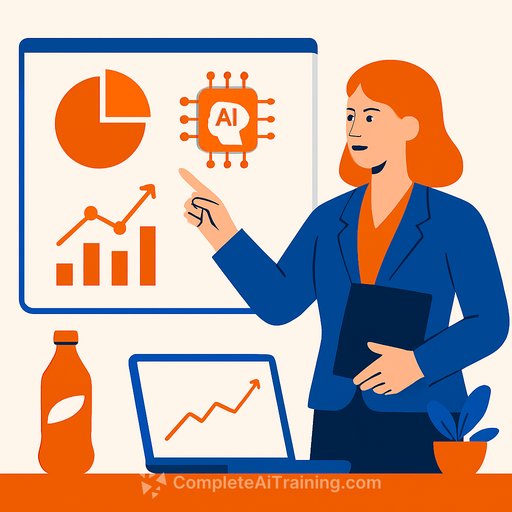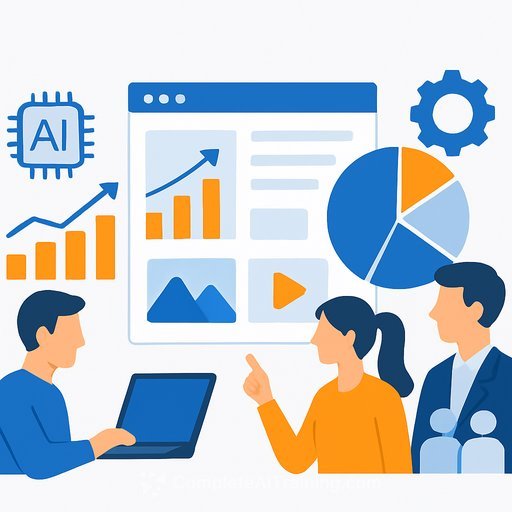PepsiCo's Susan Press On Young Talent, Budgets, Burnout, AI & Reinventing Marketing
Marketing is carrying more weight than ever. Bigger scopes, leaner teams, and a flood of AI tools. At the ADMA Global Forum, PepsiCo ANZ's marketing director for beverages, Susan Press, shared how she's reshaping the function to stay effective, resilient, and commercially sharp.
Below are the key principles she's using to build a future-ready marketing team without burning people out or diluting brand impact.
Young Talent: Digital Native, Commercially Guided
Press sees strong entrepreneurial thinking in junior marketers. They live in social and digital culture and bring sharp instincts. The gap is turning that raw signal into insight that advances the brand.
The fix: coach the translation layer. Move from cultural observations to a clear tension, then to a testable insight agencies can build on.
- Culture signal → human tension → brand-relevant insight → creative brief
- Use post-campaign reviews to show how insights link to commercial results
Training: Hire Humans, Teach Skills
Press hires for character and curiosity first, then trains skills. Her take: industry-wide training is inconsistent because urgency crowds out capability. PepsiCo counters that with a dedicated marketing transformation and capability team.
- Protect learning time on the calendar like any P&L-critical activity
- Run focused capability sprints tied to current brand priorities
Ruthless Prioritisation: Do Less, Do It Better
Multitasking is the enemy. Press pushes full presence and fewer, higher-quality bets. Meeting hygiene sets the tone.
- Invite only must-have attendees; CC the rest without pressure to join
- No laptops/side work in meetings-if you can't be present, don't attend
- Cap in-flight priorities; when something new comes in, something else comes out
Agencies As An Extension Of The Team
PepsiCo treats its agency village as true partners. They see performance numbers, problems, and forward-looking challenges-so they can own outcomes, not just outputs.
- Share business performance and constraints regularly
- Set joint problem statements and decision timelines
- Evaluate partners on impact, not activity
If you work with influencers, make vetting a core competency. Privacy and brand safety come first. Review the AANA Code of Ethics and embed it in your process.
Champions Of Change: Depth Over Dabbling
Press appoints junior "owners" for critical topics like influencer vetting-one in snacks, one in beverages. They run pilots, codify the process, and teach the team. It builds confidence, spreads expertise, and keeps transformation grounded in real work.
- Pick 2-3 transformation themes that match brand maturity and strategy
- Give champions time, a budget, and an outcome to hit
- Socialize playbooks, then scale
Budgets And Belief: Speak CFO
Press reports to a CFO who also runs the beverages business. The lesson: commercialize your marketing language. Distinction is great, but it must tie to volume, penetration, price, and profit.
- Frame brand work in business terms: demand creation, margin, cash ROI
- Use pre/post holdouts or MMM to show impact
- Connect creative choices to leading indicators (e.g., search share, mental availability)
In beverages, that discipline has supported budget growth, with a clear belief that brands are built over time and require sustained investment.
Team Design: Core, Shared, Specialists
PepsiCo runs a lean core team, taps a shared media group across snacks and beverages, and leans on specialists and global partners for transformation. The structure matches the workload and keeps focus where it matters.
AI: Useful Today, Strategic Tomorrow
The team uses AI for minutes, slides, imagery, stress tests, and case studies. The next step is a clear strategy so tools ladder up to brand and commercial goals.
- Define use cases by outcome: speed, quality, or net-new capability
- Set data, privacy, and approval rules before scale
- Measure impact: hours saved, quality uplift, learning velocity
If you're formalizing team capability, explore practical training and certification for marketers: AI Certification for Marketing Specialists and the latest curated options at Complete AI Training.
The Marketer's Skill Stack That Still Matters
- Creative judgment: can the work answer the brief and move the needle?
- Commercial acumen: tie plans to revenue, margin, and cash impact
- Brand foundations: distinctive assets, memory structures, consistent codes
- Selective tech adoption: pick what matters, ignore the rest
- Capacity management: saying "no" to protect quality and health
Trying to do everything is how teams burn out and brands go nowhere. Do less. Finish more. Make it count.
90-Day Playbook To Reinvent Your Team
- Week 1-2: Audit priorities, kill or pause 25% of low-impact work
- Week 2-3: Reset meeting rules; publish "present or decline" norms
- Week 3-6: Appoint two Champions of Change; run one pilot each
- Week 4-8: Build a simple CFO-facing scorecard for brand activity
- Week 6-10: Define AI use cases, guardrails, and impact metrics
- Week 8-12: Run one capability sprint tied to current brand goals
This is how you keep fundamentals tight, build real capability, and ship work that moves the business.
Related reading: ADMA's programs and events for data-driven marketers are a useful reference point for capability-building in Australia. ADMA
Your membership also unlocks:






